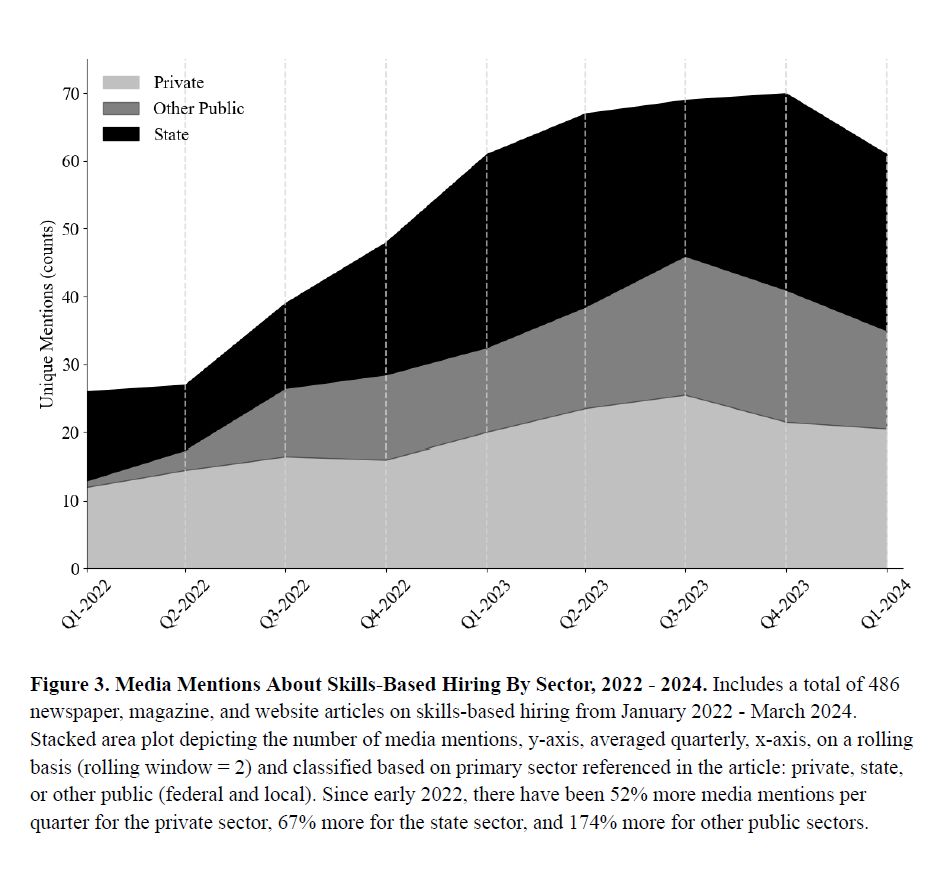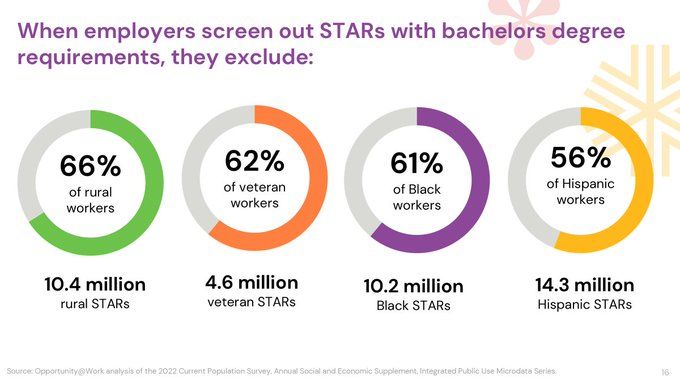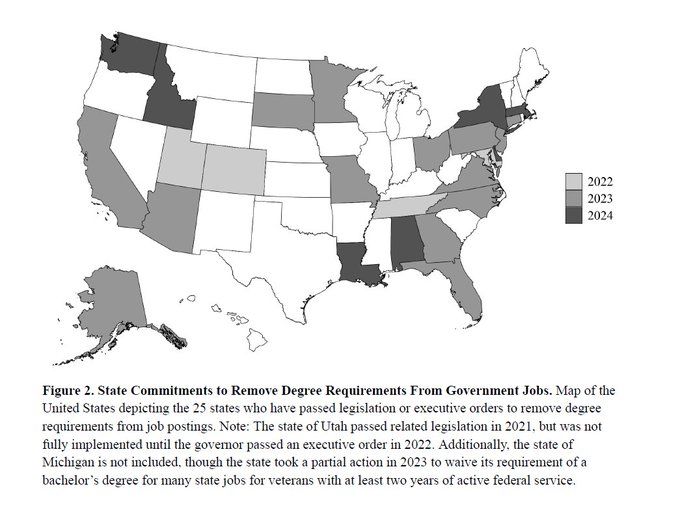Prof. Peter Q. Blair
@pqblair.bsky.social
Dr. Peter Q. Blair | Faculty @Harvard Grad School of Ed | Co-Director, Harvard Project on Workforce
🔬 Research: Economics of education, labor, public policy, & digitization
📊 NBER Faculty Research Associate | PI of BE-Lab
🇺🇸 Volunteer Economist, Biden-
🔬 Research: Economics of education, labor, public policy, & digitization
📊 NBER Faculty Research Associate | PI of BE-Lab
🇺🇸 Volunteer Economist, Biden-
Still in awe of my colleague Claudia Goldin, who made history two years ago as the first woman to win a solo Nobel in Economics. 💫 Tomorrow, we’ll learn who joins her on that remarkable list — any guesses? 🏆👇🏽

October 13, 2025 at 1:04 AM
Still in awe of my colleague Claudia Goldin, who made history two years ago as the first woman to win a solo Nobel in Economics. 💫 Tomorrow, we’ll learn who joins her on that remarkable list — any guesses? 🏆👇🏽
7/ Impact for STARs:
Our analysis estimates that these policies increased middle- and high-wage job openings for STARs in adopting states!
Our analysis estimates that these policies increased middle- and high-wage job openings for STARs in adopting states!

December 9, 2024 at 9:26 PM
7/ Impact for STARs:
Our analysis estimates that these policies increased middle- and high-wage job openings for STARs in adopting states!
Our analysis estimates that these policies increased middle- and high-wage job openings for STARs in adopting states!
6/ Public Awareness of STARs:
Our text analysis shows a 67% rise in state-level mentions of "skills-based hiring" since 2022. The public sector is leading the charge on increasing awareness about STARs. 📰
Our text analysis shows a 67% rise in state-level mentions of "skills-based hiring" since 2022. The public sector is leading the charge on increasing awareness about STARs. 📰


December 9, 2024 at 9:26 PM
6/ Public Awareness of STARs:
Our text analysis shows a 67% rise in state-level mentions of "skills-based hiring" since 2022. The public sector is leading the charge on increasing awareness about STARs. 📰
Our text analysis shows a 67% rise in state-level mentions of "skills-based hiring" since 2022. The public sector is leading the charge on increasing awareness about STARs. 📰
5/ Why Does this Matter?
STARs represent over 70 million U.S. workers who gain skills through work experience, as in the Becker Model of Human Capital.
Historically, these workers have been overlooked for many public-sector roles by degree filters.
#STARs #FutureofWork
STARs represent over 70 million U.S. workers who gain skills through work experience, as in the Becker Model of Human Capital.
Historically, these workers have been overlooked for many public-sector roles by degree filters.
#STARs #FutureofWork

December 9, 2024 at 9:26 PM
5/ Why Does this Matter?
STARs represent over 70 million U.S. workers who gain skills through work experience, as in the Becker Model of Human Capital.
Historically, these workers have been overlooked for many public-sector roles by degree filters.
#STARs #FutureofWork
STARs represent over 70 million U.S. workers who gain skills through work experience, as in the Becker Model of Human Capital.
Historically, these workers have been overlooked for many public-sector roles by degree filters.
#STARs #FutureofWork
4/ Key Findings:
States adopting these policies reduced bachelor's degree requirements in job postings by 2.5-3 percentage points annually.
This shift translates to thousands of new opportunities for STARs previously screened out by degree requirements!
States adopting these policies reduced bachelor's degree requirements in job postings by 2.5-3 percentage points annually.
This shift translates to thousands of new opportunities for STARs previously screened out by degree requirements!

December 9, 2024 at 9:26 PM
4/ Key Findings:
States adopting these policies reduced bachelor's degree requirements in job postings by 2.5-3 percentage points annually.
This shift translates to thousands of new opportunities for STARs previously screened out by degree requirements!
States adopting these policies reduced bachelor's degree requirements in job postings by 2.5-3 percentage points annually.
This shift translates to thousands of new opportunities for STARs previously screened out by degree requirements!
2/ Context
In the last 2 years, 25 states have moved to reduce unnecessary degree requirements for public-sector jobs. These policies aim to open doors for workers Skilled Through Alternative Routes (STARs) 🚪✨.
In the last 2 years, 25 states have moved to reduce unnecessary degree requirements for public-sector jobs. These policies aim to open doors for workers Skilled Through Alternative Routes (STARs) 🚪✨.

December 9, 2024 at 9:26 PM
2/ Context
In the last 2 years, 25 states have moved to reduce unnecessary degree requirements for public-sector jobs. These policies aim to open doors for workers Skilled Through Alternative Routes (STARs) 🚪✨.
In the last 2 years, 25 states have moved to reduce unnecessary degree requirements for public-sector jobs. These policies aim to open doors for workers Skilled Through Alternative Routes (STARs) 🚪✨.
5/ Why Does this Matter?
STARs represent over 70 million U.S. workers who gain skills through work experience, as in the Becker Model of Human Capital.
Historically, these workers have been overlooked for many public-sector roles by degree filters.
#STARs #FutureofWork
STARs represent over 70 million U.S. workers who gain skills through work experience, as in the Becker Model of Human Capital.
Historically, these workers have been overlooked for many public-sector roles by degree filters.
#STARs #FutureofWork

December 9, 2024 at 9:17 PM
5/ Why Does this Matter?
STARs represent over 70 million U.S. workers who gain skills through work experience, as in the Becker Model of Human Capital.
Historically, these workers have been overlooked for many public-sector roles by degree filters.
#STARs #FutureofWork
STARs represent over 70 million U.S. workers who gain skills through work experience, as in the Becker Model of Human Capital.
Historically, these workers have been overlooked for many public-sector roles by degree filters.
#STARs #FutureofWork
4/ Key Findings:
States adopting these policies reduced bachelor's degree requirements in job postings by 2.5-3 percentage points annually.
This shift translates to thousands of new opportunities for STARs previously screened out by degree requirements!
States adopting these policies reduced bachelor's degree requirements in job postings by 2.5-3 percentage points annually.
This shift translates to thousands of new opportunities for STARs previously screened out by degree requirements!

December 9, 2024 at 9:17 PM
4/ Key Findings:
States adopting these policies reduced bachelor's degree requirements in job postings by 2.5-3 percentage points annually.
This shift translates to thousands of new opportunities for STARs previously screened out by degree requirements!
States adopting these policies reduced bachelor's degree requirements in job postings by 2.5-3 percentage points annually.
This shift translates to thousands of new opportunities for STARs previously screened out by degree requirements!
2/ Context
In the last 2 years, 25 states have moved to reduce unnecessary degree requirements for public-sector jobs. These policies aim to open doors for workers Skilled Through Alternative Routes (STARs) 🚪✨
In the last 2 years, 25 states have moved to reduce unnecessary degree requirements for public-sector jobs. These policies aim to open doors for workers Skilled Through Alternative Routes (STARs) 🚪✨

December 9, 2024 at 9:17 PM
2/ Context
In the last 2 years, 25 states have moved to reduce unnecessary degree requirements for public-sector jobs. These policies aim to open doors for workers Skilled Through Alternative Routes (STARs) 🚪✨
In the last 2 years, 25 states have moved to reduce unnecessary degree requirements for public-sector jobs. These policies aim to open doors for workers Skilled Through Alternative Routes (STARs) 🚪✨

